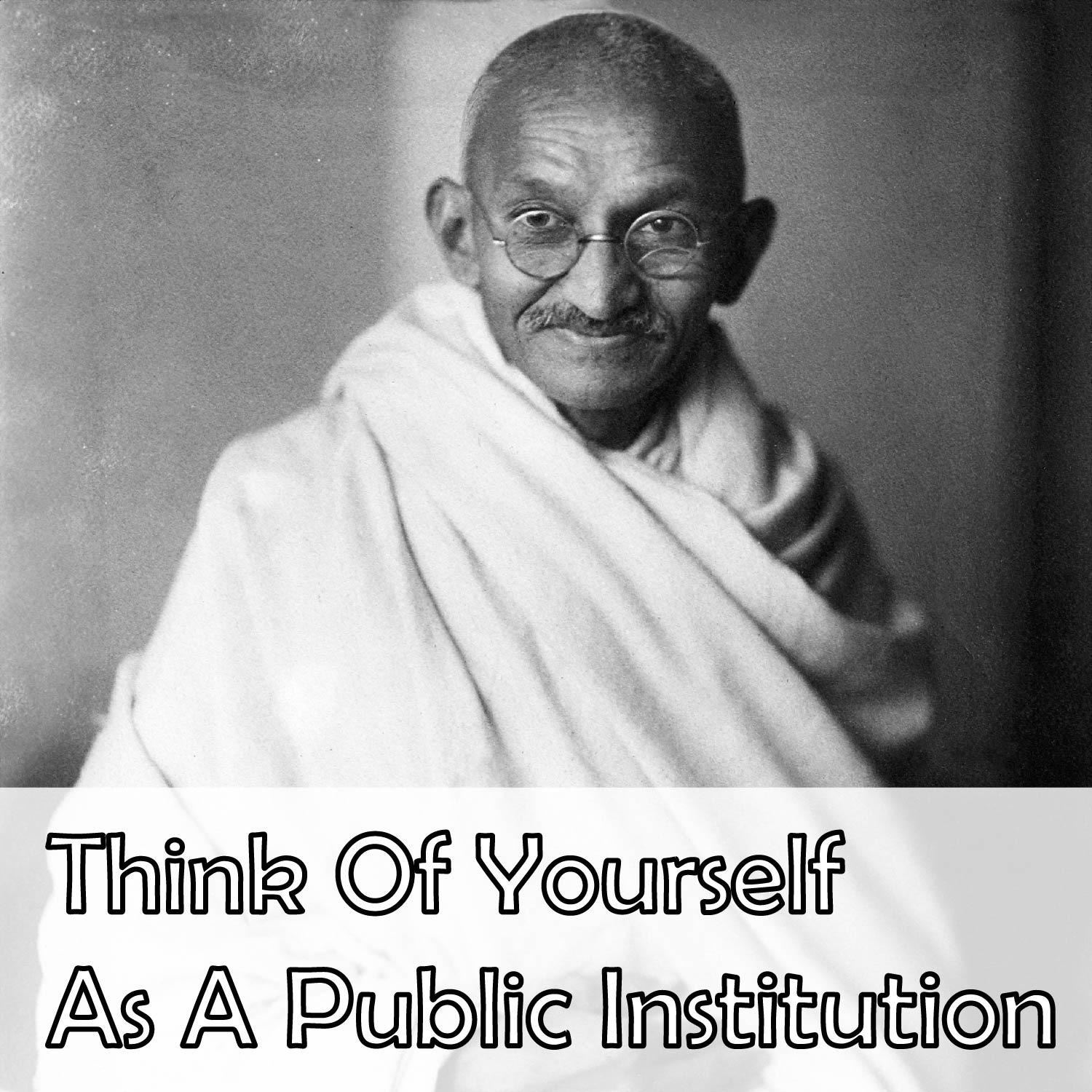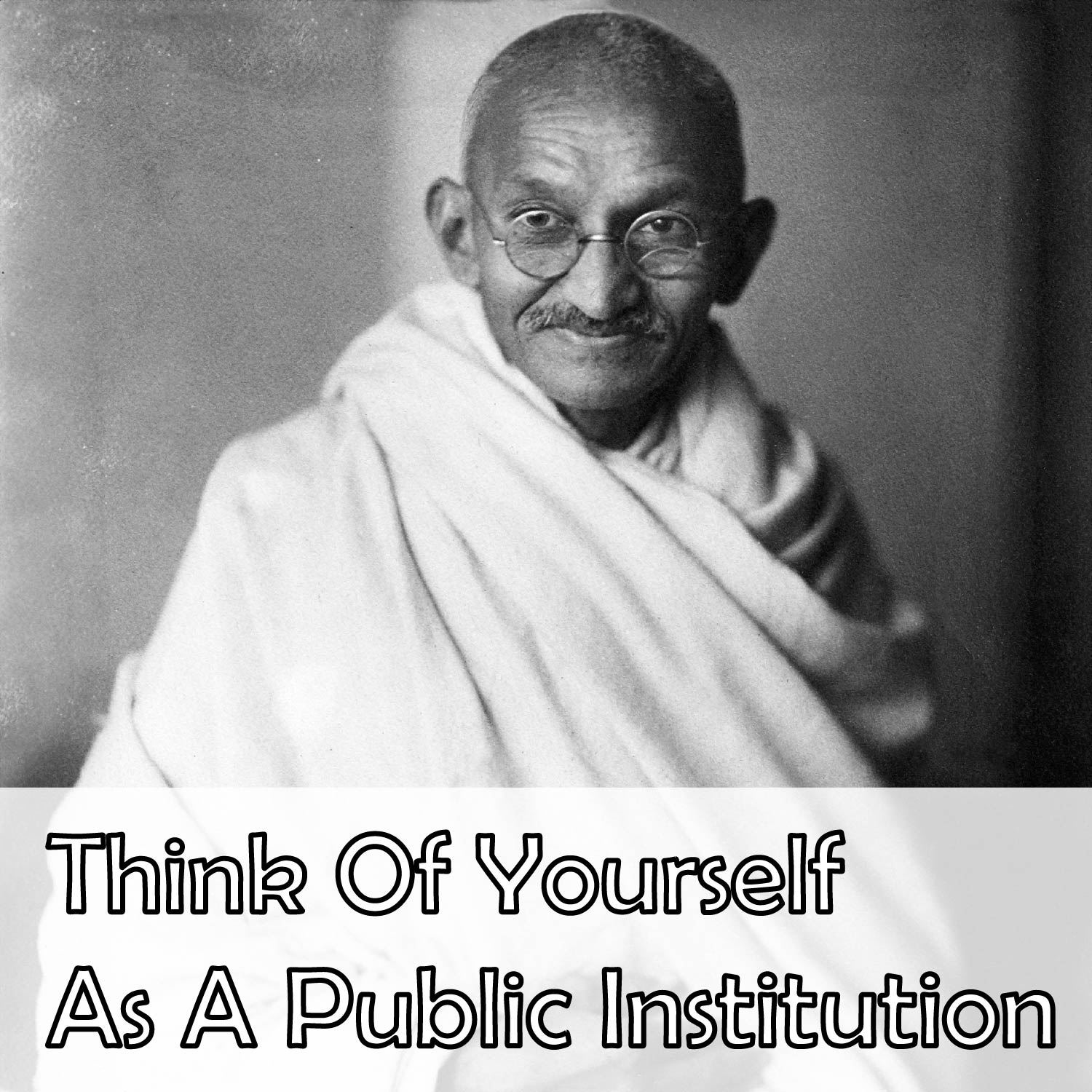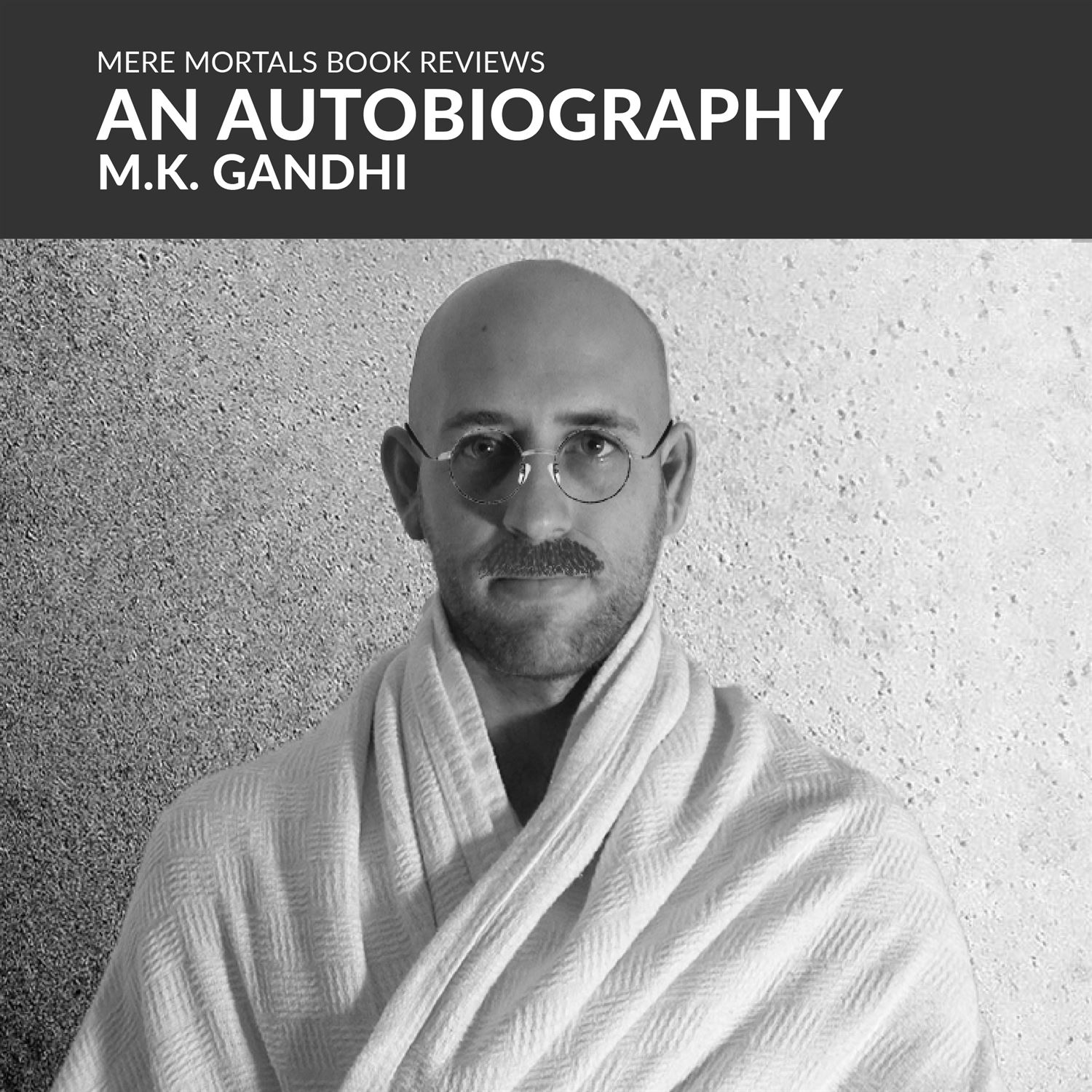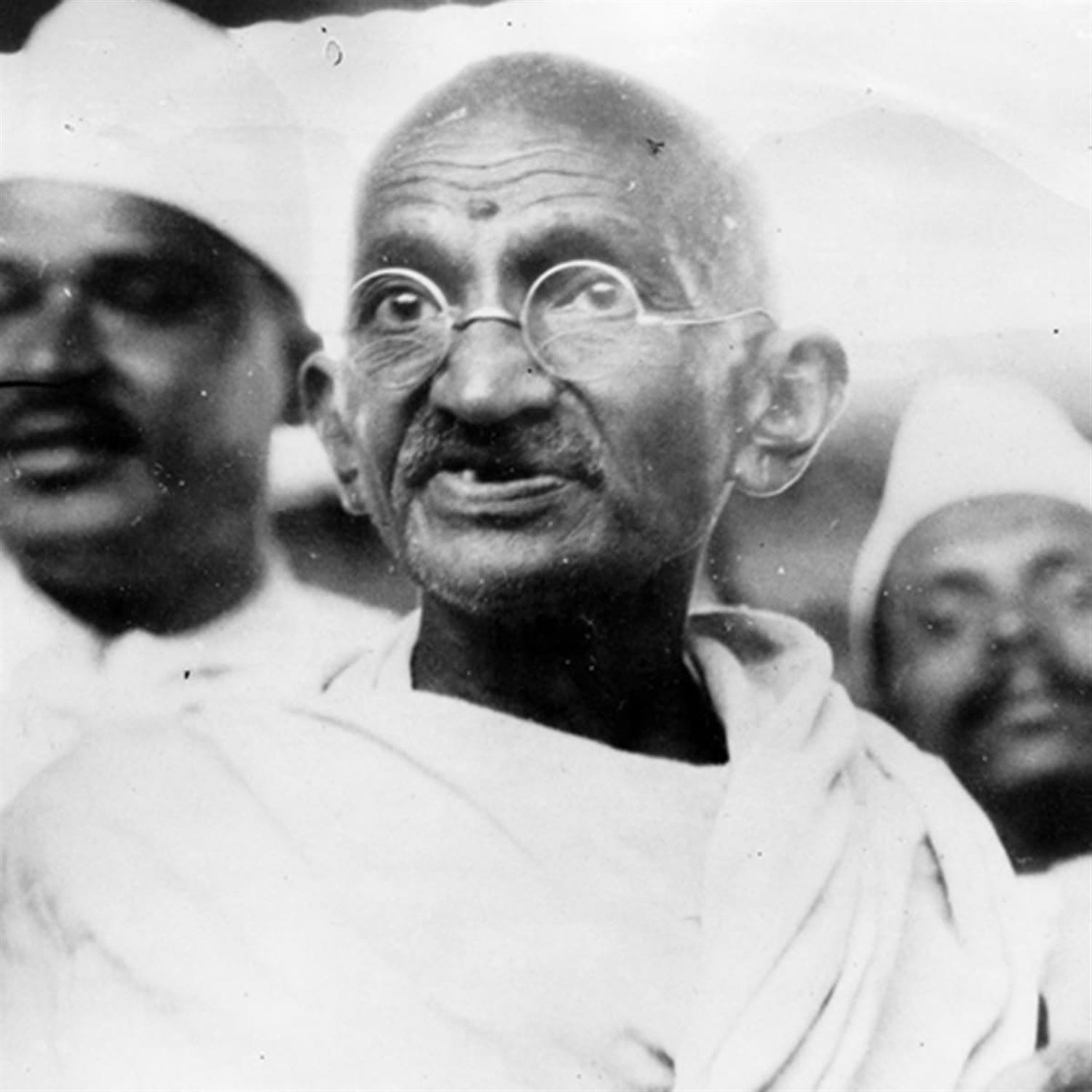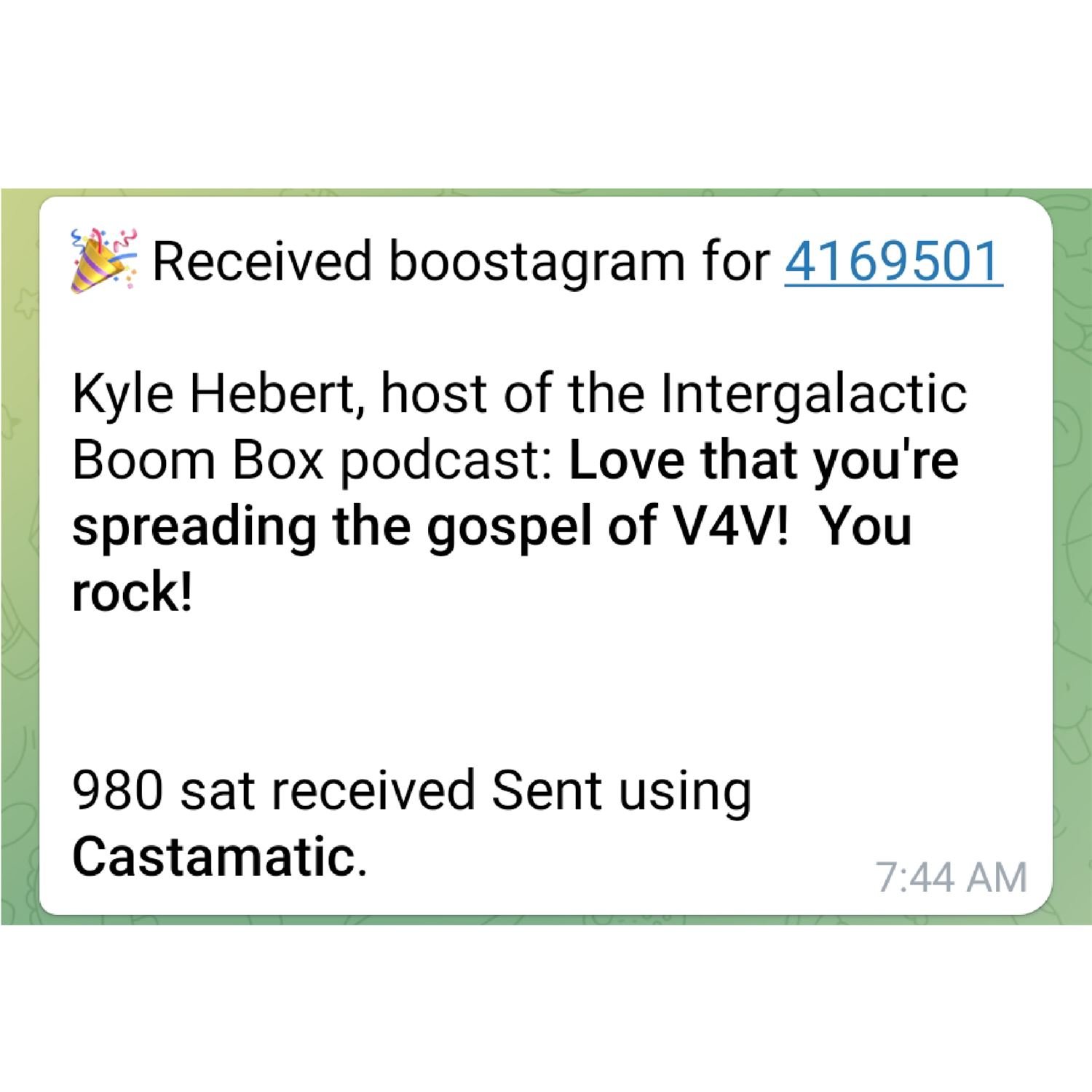Why can having permanent funds can alienate you from your support?
In Ep #8 I was inspired by a passage I read in M.K Gandhi\'s autobiography on why having a reliable, permanently fixed and disconnected source of funds can actually be bad for you. It can make you lose touch with the public support that is essential to fulfilling your real, deeper, higher purpose. The V4V model is all about closing the loop and connecting with those people gaining value from your show/product/art, hence why boostagrams and streaming satoshis are such a gamechanger!
Mad shoutout to Kyle Hebert for the boostagram and Adam Curry for the intro jingle. Very much appreciated.
Value 4 Value Support:
Boostagram: https://www.meremortalspodcast.com/support
Paypal: https://www.paypal.com/paypalme/meremortalspodcast
Connect With Kyrin/Mere Mortals:
Website: https://www.meremortalspodcast.com/
Discord: https://discord.gg/jjfq9eGReU
Twitter/X: https://twitter.com/meremortalspods
Instagram: https://www.instagram.com/meremortalspodcasts/
TikTok: https://www.tiktok.com/@meremortalspodcasts
In Ep #8 I was inspired by a passage I read in M.K Gandhi\'s autobiography on why having a reliable, permanently fixed and disconnected source of funds can actually be bad for you. It can make you lose touch with the public support that is essential to fulfilling your real, deeper, higher purpose. The V4V model is all about closing the loop and connecting with those people gaining value from your show/product/art, hence why boostagrams and streaming satoshis are such a gamechanger!
Mad shoutout to Kyle Hebert for the boostagram and Adam Curry for the intro jingle. Very much appreciated.
Value 4 Value Support:
Boostagram: https://www.meremortalspodcast.com/support
Paypal: https://www.paypal.com/paypalme/meremortalspodcast
Connect With Kyrin/Mere Mortals:
Website: https://www.meremortalspodcast.com/
Discord: https://discord.gg/jjfq9eGReU
Twitter/X: https://twitter.com/meremortalspods
Instagram: https://www.instagram.com/meremortalspodcasts/
TikTok: https://www.tiktok.com/@meremortalspodcasts
[00:00:01]
Unknown:
Hey, hey you handsome devil, and welcome to Episode Eight of the value for value podcast, which is an expansion and exploration of the value for value model. Now, if you're unsure of what that is, I would suggest going back to Episode One, this would give you a good idea of the heart of it and expand it in detail. But in essence, I would say it's the creation of value economy. So I create value by producing something through a digital means, which can be in comedic form entertainment, useful tips, things like that. And I ask for value in return. So whether that be time talent, treasure, however, it is that you want to provide it, essentially a way for an independent creator, an artist, musician, podcast, whatever you want to call yourself to not rely on the standard advertising model, which has some serious serious flaws with it. Now, I wanted to go in today's episode about why having permanent funds can alienate you from your support. And you might be thinking, how the hell does that relate to the title of think of yourself as a public institution? Well, I shall expand on that right now. I've recently been reading Mahatma Gandhi's autobiography, which used to be called my experiments with truth, I believe now, it's just called an autobiography.
And there was a particular section here under the chapter calm after the storm. And if you have this book, it's on page 188. And essentially, the backstory to this is Gandhi was in South Africa, and he was fighting against some of the racism, some of the injustices that were occurring there. And he created this thing called the natal Indian Congress. And this was to fight for Indian rights, essentially, them now, when he created this, he was thinking, oh, you know what, I think we should establish a fund and use this fund to invest in a property and then we'll live off the rent for this. So then we don't have to think about constant continually having to garner up funds to pay for, you know, the all associated things with that occur when you're trying to form an organization, create rights for yourself, you know, you there's paper expenses, there's labor expenses, there's travel expenses, all that sort of thing. And so he was saying that we'll start to set up a permanent fund. And we will just have this we won't need to worry about now. And now, he actually had some interesting things to say on this. And essentially, it led to some infighting later on about the fund itself, how it was being managed. And he explored this a little bit. So to read from his book, I'm jumping here on to page 188. And then he says, it has become my firm conviction that is not good to run public institutions on permanent funds. A permanent fund carries in itself the seed of the moral fall of the institution, a public institution means an institution conducted with the approval and from the funds of the public.
When such an institution ceases to have public support, it forfeits its right to exist, institutions maintained on permanent funds are often found to ignore public opinion, and are frequently responsible for acts contrary to it. In our country, we experienced this at every step. And what I really found fascinating that was how this can be translated to the value for value model. So if you think about it, this is perfect for those who are running a cause or charity or a business. So the value for value model, essentially, once I said, again, I said, creating value and then asking for that in return, and you don't get that return in a lump sum, it's more upon a continual basis. So whether that be with your music, or whether that be through your podcast, or your art, or whatever it is, it's a way of continually getting those funds coming in.
And in this particular case, we're talking about funds, talking about money, but this can also apply to people's help with your podcast in some editing, or it can be spreading it via word of mouth, whatever way it is that you're, you're asking your supporters, your audience to help you out. And it's just saying, like, Hey, I'm continually doing this. And so I'm really gonna have my pulse all the time on what it is that my audience wants, what they are responding to, and what they appreciate what that they value, because when you do have this permanent fund set aside, that sort of is sorted, you are then free to follow whatever path it is that you want. And you're not going to get that feedback coming in of people saying, like, hey, I really enjoyed this part of what you're doing, or I really didn't enjoy what you're doing. Now. I think you're doing some weird stuff. I'm not sure I'm liking what you're saying.
So particularly, if you're running a charity or a business of some time of some sort, the value for value models is really good for this because obviously, with the charity, you need to be making sure that you're actually helping the people and that people are seeing, Oh, yes, you're doing this with your funds. I'm going to support you now rather than just having big lumps on. Alright, we'll use this to pay off our expenses. You know, what should we do this thing? Well, okay, I guess we can do that. And you're not getting that feedback. So it's keeping in touch with your public support, essentially. So You'll know if you're doing something dumb, stupid behaving badly when the Satoshi has stopped rolling in. So that's a good method there of of determining, hey, this is what I should be doing. caveat here, of course, is that you need to make sure that you're not following a path just because people are sending your money. So if you're set up some sort of charity to help the endangered wildlife, and then you start getting hunters, giving you some money, and you know, asking you to do certain things that go across those moral ethical values, okay, well, that you might have a problem there, and you need to be aware of that. But in essence, it's really just getting to that not relying on a single fund and getting that continual feedback from your audience. So for me, personally, I sort of think that money should be somewhat tedious. So it's like a means to achieve your real deeper, higher purpose. And so money in this case, having that coming in, consistently is an aid to that. And when you just have it set aside, I'm just going to create this thing, I'm going to do this, whatever, I don't need to put in the full amount of effort because you know, what, there's my audience, you know, they'll they'll be okay with this thing. But if you're relying on this next product, this next episode to really wow your audience, how you're going to put in some more effort to make that happen. So, the caveat of course with this is that you know, the value value is is not for everyone. So, even Gandhi himself had a remark on this. So he said my remarks do not apply to the bodies which cannot by their very nature be conducted without permanent buildings. What I mean to say is that the current expenditure should be from found from subscriptions voluntary received from year to year, so even he was acknowledging they're like, Hey, this is this having this permanent fund is sometimes useful, but in cases of public institutions should not be but you know, not everyone's a public institution.
This was getting to my original title though, think of yourself as a public institution. So you know what, maybe you should think of yourself as something that's trying to do good in the world that's trying to improve things and therefore, maybe you shouldn't ask your audience to contribute to a GoFundMe page to set yourself up for funds for this infrastructure or whatnot, maybe you should say You know what, I'm going to rely on this day by day my effort being put in for the value on receiving and return so I just thought that was a an interesting idea and wanted to explore that. Now we are on to our favorite section here I'm going to call it the boostagram lounge This is the official naming of it and I have with this official naming some official music so this is a perfect example of how the value for value model can work I listened to the podcasting 2.0 show all the time and I really like Adams ability to create music and jingles within the podcast itself so I sent him a boostagram and said hey, would you be able to create one an EPA essential type of boostagram lounge intro for me and man he went above and beyond and created three or four of them I guess if you if you really want to get into it. I will play the first one here and I will want to do it justice. Although I think I will regularly in the future have a different sort of one. But here we go. The first attempt of Adam creating a jingle intro for the boostagram lounge.
Welcome, today value for value boostagram lounge. hookah speechless. Wasn't that completely over the top? I absolutely love it. Although I don't think I will be making that into the regular definitely not essential enough for a lounge. I mean, it's you know, it's got the hook as and whatnot but a bit too much a bit too much for me. Anyway, we will get to our boostagram for this week. So we've got one coming in. Thank you very much to Mr. Kyle. Hey, bear, host of the intergalactic boom box podcast. Kyle says love that you're spreading the gospel of visa vie exclamation mark you rock. Thank you so much, Kyle. Now he's sent that through multiple donations through cast ematic it's really hard to tell with caster Matic the boosting system there is a little bit weird at the moment.
But that was 980 1960 I think was even more than that. Because that says it's like a big boost right at the bottom so maybe even getting up to like 11k Kyle man thank you so much made that I really do appreciate that and yes, I do want to spread more of the gospel of the value for valium and trying to improve the show a little bit is slightly too long at the moment. I think I can cut it down a little bit with my rambling but I do like to try and do podcasts all in one take try and keep that flow as much as I can obviously with the insertion of the boosta Gram lounge in the middle as well. So Kyle, if you have not heard of him before I and I would strongly recommend to check out At his his podcast, he is the Gohan in the Funimation dub of Dragon Ball Z he is Ray you and the Street Fighter games I believe is a Jojo. Jojo is bizarre adventures characters Kiba in Nougat in Naruto, Naruto, and Neff, Atari Cobra, and one piece, I had a look at his Instagram, not Instagram page Wikipedia page. And man, I think it's so funny. I'm pretty sure Carl has appeared in multiple stages of my life with me watching anime, with me getting into the, you know, all the crazy stuff that comes out of Japan and the animations of like, fantastic. So it's so funny to connect with him and, you know, be in the same world right now. Considering he was an inadvertently and unknowingly a voice in my past almost, which is very, very strange. Anyway, I would say my request for this week is for those who have yet to try out the the podcasting 2.0 value for value model all of these sorts of things, send a boostagram and I would actually recommend to send it to Kyle, so go to his podcast, send him a histogram, he does respond to him, he does read them out like I do in the show. So doesn't matter how big or small it is, it's your reflection of the value of what you got from that podcast. If you thought it was a fantastic episode, give it 10 bucks, 100 bucks, 1000 bucks, maybe not 1000. It's a bit too early at this stage. But in the future, you will be able to do that. And in any case, I would just say give it a try test it out because there's something really satisfying about using the podcast app listening to the episode sending a message whilst listening so it's fresh in your mind, they can see if they've got it set it up correctly, where it came in. So they have reference to what it is you're talking about. And then be them being able to respond to that on the next show. Or whenever they choose to is just fantastic.
It's so much fun. I try and do it all the time myself every show that I can that I know does the value for value model because it is honestly a blast and having that audience interaction is next level. And if you've ever really joined into it like a YouTube Live or streaming or twitch or any of that you will sort of get what it is to feel like when you're watching someone and they respond live to it or they respond in the next episode and give you some shout outs and things like that. So that's my recommendation for this week. Send a boostagram to Kyle host of the intergalactic boombox podcast. He will respond to it he will enjoy it and you will enjoy it as well. That's it for today. stop rambling Kyrin out
Hey, hey you handsome devil, and welcome to Episode Eight of the value for value podcast, which is an expansion and exploration of the value for value model. Now, if you're unsure of what that is, I would suggest going back to Episode One, this would give you a good idea of the heart of it and expand it in detail. But in essence, I would say it's the creation of value economy. So I create value by producing something through a digital means, which can be in comedic form entertainment, useful tips, things like that. And I ask for value in return. So whether that be time talent, treasure, however, it is that you want to provide it, essentially a way for an independent creator, an artist, musician, podcast, whatever you want to call yourself to not rely on the standard advertising model, which has some serious serious flaws with it. Now, I wanted to go in today's episode about why having permanent funds can alienate you from your support. And you might be thinking, how the hell does that relate to the title of think of yourself as a public institution? Well, I shall expand on that right now. I've recently been reading Mahatma Gandhi's autobiography, which used to be called my experiments with truth, I believe now, it's just called an autobiography.
And there was a particular section here under the chapter calm after the storm. And if you have this book, it's on page 188. And essentially, the backstory to this is Gandhi was in South Africa, and he was fighting against some of the racism, some of the injustices that were occurring there. And he created this thing called the natal Indian Congress. And this was to fight for Indian rights, essentially, them now, when he created this, he was thinking, oh, you know what, I think we should establish a fund and use this fund to invest in a property and then we'll live off the rent for this. So then we don't have to think about constant continually having to garner up funds to pay for, you know, the all associated things with that occur when you're trying to form an organization, create rights for yourself, you know, you there's paper expenses, there's labor expenses, there's travel expenses, all that sort of thing. And so he was saying that we'll start to set up a permanent fund. And we will just have this we won't need to worry about now. And now, he actually had some interesting things to say on this. And essentially, it led to some infighting later on about the fund itself, how it was being managed. And he explored this a little bit. So to read from his book, I'm jumping here on to page 188. And then he says, it has become my firm conviction that is not good to run public institutions on permanent funds. A permanent fund carries in itself the seed of the moral fall of the institution, a public institution means an institution conducted with the approval and from the funds of the public.
When such an institution ceases to have public support, it forfeits its right to exist, institutions maintained on permanent funds are often found to ignore public opinion, and are frequently responsible for acts contrary to it. In our country, we experienced this at every step. And what I really found fascinating that was how this can be translated to the value for value model. So if you think about it, this is perfect for those who are running a cause or charity or a business. So the value for value model, essentially, once I said, again, I said, creating value and then asking for that in return, and you don't get that return in a lump sum, it's more upon a continual basis. So whether that be with your music, or whether that be through your podcast, or your art, or whatever it is, it's a way of continually getting those funds coming in.
And in this particular case, we're talking about funds, talking about money, but this can also apply to people's help with your podcast in some editing, or it can be spreading it via word of mouth, whatever way it is that you're, you're asking your supporters, your audience to help you out. And it's just saying, like, Hey, I'm continually doing this. And so I'm really gonna have my pulse all the time on what it is that my audience wants, what they are responding to, and what they appreciate what that they value, because when you do have this permanent fund set aside, that sort of is sorted, you are then free to follow whatever path it is that you want. And you're not going to get that feedback coming in of people saying, like, hey, I really enjoyed this part of what you're doing, or I really didn't enjoy what you're doing. Now. I think you're doing some weird stuff. I'm not sure I'm liking what you're saying.
So particularly, if you're running a charity or a business of some time of some sort, the value for value models is really good for this because obviously, with the charity, you need to be making sure that you're actually helping the people and that people are seeing, Oh, yes, you're doing this with your funds. I'm going to support you now rather than just having big lumps on. Alright, we'll use this to pay off our expenses. You know, what should we do this thing? Well, okay, I guess we can do that. And you're not getting that feedback. So it's keeping in touch with your public support, essentially. So You'll know if you're doing something dumb, stupid behaving badly when the Satoshi has stopped rolling in. So that's a good method there of of determining, hey, this is what I should be doing. caveat here, of course, is that you need to make sure that you're not following a path just because people are sending your money. So if you're set up some sort of charity to help the endangered wildlife, and then you start getting hunters, giving you some money, and you know, asking you to do certain things that go across those moral ethical values, okay, well, that you might have a problem there, and you need to be aware of that. But in essence, it's really just getting to that not relying on a single fund and getting that continual feedback from your audience. So for me, personally, I sort of think that money should be somewhat tedious. So it's like a means to achieve your real deeper, higher purpose. And so money in this case, having that coming in, consistently is an aid to that. And when you just have it set aside, I'm just going to create this thing, I'm going to do this, whatever, I don't need to put in the full amount of effort because you know, what, there's my audience, you know, they'll they'll be okay with this thing. But if you're relying on this next product, this next episode to really wow your audience, how you're going to put in some more effort to make that happen. So, the caveat of course with this is that you know, the value value is is not for everyone. So, even Gandhi himself had a remark on this. So he said my remarks do not apply to the bodies which cannot by their very nature be conducted without permanent buildings. What I mean to say is that the current expenditure should be from found from subscriptions voluntary received from year to year, so even he was acknowledging they're like, Hey, this is this having this permanent fund is sometimes useful, but in cases of public institutions should not be but you know, not everyone's a public institution.
This was getting to my original title though, think of yourself as a public institution. So you know what, maybe you should think of yourself as something that's trying to do good in the world that's trying to improve things and therefore, maybe you shouldn't ask your audience to contribute to a GoFundMe page to set yourself up for funds for this infrastructure or whatnot, maybe you should say You know what, I'm going to rely on this day by day my effort being put in for the value on receiving and return so I just thought that was a an interesting idea and wanted to explore that. Now we are on to our favorite section here I'm going to call it the boostagram lounge This is the official naming of it and I have with this official naming some official music so this is a perfect example of how the value for value model can work I listened to the podcasting 2.0 show all the time and I really like Adams ability to create music and jingles within the podcast itself so I sent him a boostagram and said hey, would you be able to create one an EPA essential type of boostagram lounge intro for me and man he went above and beyond and created three or four of them I guess if you if you really want to get into it. I will play the first one here and I will want to do it justice. Although I think I will regularly in the future have a different sort of one. But here we go. The first attempt of Adam creating a jingle intro for the boostagram lounge.
Welcome, today value for value boostagram lounge. hookah speechless. Wasn't that completely over the top? I absolutely love it. Although I don't think I will be making that into the regular definitely not essential enough for a lounge. I mean, it's you know, it's got the hook as and whatnot but a bit too much a bit too much for me. Anyway, we will get to our boostagram for this week. So we've got one coming in. Thank you very much to Mr. Kyle. Hey, bear, host of the intergalactic boom box podcast. Kyle says love that you're spreading the gospel of visa vie exclamation mark you rock. Thank you so much, Kyle. Now he's sent that through multiple donations through cast ematic it's really hard to tell with caster Matic the boosting system there is a little bit weird at the moment.
But that was 980 1960 I think was even more than that. Because that says it's like a big boost right at the bottom so maybe even getting up to like 11k Kyle man thank you so much made that I really do appreciate that and yes, I do want to spread more of the gospel of the value for valium and trying to improve the show a little bit is slightly too long at the moment. I think I can cut it down a little bit with my rambling but I do like to try and do podcasts all in one take try and keep that flow as much as I can obviously with the insertion of the boosta Gram lounge in the middle as well. So Kyle, if you have not heard of him before I and I would strongly recommend to check out At his his podcast, he is the Gohan in the Funimation dub of Dragon Ball Z he is Ray you and the Street Fighter games I believe is a Jojo. Jojo is bizarre adventures characters Kiba in Nougat in Naruto, Naruto, and Neff, Atari Cobra, and one piece, I had a look at his Instagram, not Instagram page Wikipedia page. And man, I think it's so funny. I'm pretty sure Carl has appeared in multiple stages of my life with me watching anime, with me getting into the, you know, all the crazy stuff that comes out of Japan and the animations of like, fantastic. So it's so funny to connect with him and, you know, be in the same world right now. Considering he was an inadvertently and unknowingly a voice in my past almost, which is very, very strange. Anyway, I would say my request for this week is for those who have yet to try out the the podcasting 2.0 value for value model all of these sorts of things, send a boostagram and I would actually recommend to send it to Kyle, so go to his podcast, send him a histogram, he does respond to him, he does read them out like I do in the show. So doesn't matter how big or small it is, it's your reflection of the value of what you got from that podcast. If you thought it was a fantastic episode, give it 10 bucks, 100 bucks, 1000 bucks, maybe not 1000. It's a bit too early at this stage. But in the future, you will be able to do that. And in any case, I would just say give it a try test it out because there's something really satisfying about using the podcast app listening to the episode sending a message whilst listening so it's fresh in your mind, they can see if they've got it set it up correctly, where it came in. So they have reference to what it is you're talking about. And then be them being able to respond to that on the next show. Or whenever they choose to is just fantastic.
It's so much fun. I try and do it all the time myself every show that I can that I know does the value for value model because it is honestly a blast and having that audience interaction is next level. And if you've ever really joined into it like a YouTube Live or streaming or twitch or any of that you will sort of get what it is to feel like when you're watching someone and they respond live to it or they respond in the next episode and give you some shout outs and things like that. So that's my recommendation for this week. Send a boostagram to Kyle host of the intergalactic boombox podcast. He will respond to it he will enjoy it and you will enjoy it as well. That's it for today. stop rambling Kyrin out

